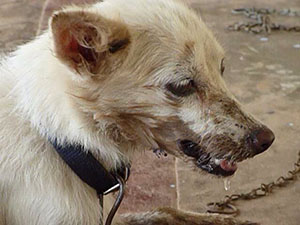Australia is one of the few countries in the world that remains free of rabies.
If rabies became established in Australia, the toll on human and animal health would be profound and the cost of response and elimination immense.
At least 60,000 people die from rabies each year, with the majority of these deaths occurring in Africa and Asia. Over 99% of these cases are caused by bites from infected dogs. Vaccination of dogs is the proven way of preventing human exposure and eliminating disease at source in rabies endemic countries.
The Department of Agriculture, Fisheries and Forestry works overseas, at the border and with communities across Australia to keep us free from rabies and other exotic diseases.
Greater emphasis has been placed on rabies preparedness and surveillance in recent years because the rabies virus has continued to spread through the eastern islands of Indonesia, which are very close to our northern borders.
International partnerships
We partner with other countries and organisations to improve prevention, early detection, preparedness, response and elimination options for rabies and other emerging and infectious diseases.
Through the World Organisation for Animal Health (WOAH), Australia has provided assistance for a vaccine bank that includes dog rabies vaccines that can be gifted to support dog-transmitted rabies control and elimination programs.
We support our close neighbours, Papua New Guinea (PNG) and Timor-Leste, to stay free from rabies through:
- assistance with rabies prevention and response strategies
- strengthening diagnostic capacity and integrated surveillance
- development of national rabies management plans, outlining their approach to control and elimination of the disease.
In 2022 we funded a regional rabies project to support the Indonesian Government in controlling dog-transmitted rabies especially in Bali,. The project gifted 200,000 dog rabies vaccines in 2022 and a further 200,000 vaccine doses through the WOAH vaccine bank in 2023.
Working with communities in Australia
We engage Indigenous communities in northern Australia as part of the Northern Australia Quarantine Strategy (NAQS). These communities play a vital role in ensuring Australia maintains its freedom from rabies and other exotic diseases.
Community Animal Health Surveillance Program
The Community Animal Health Surveillance Program runs across the north of Australia as part of the Indigenous Ranger Biosecurity Program.
Indigenous rangers report quarterly on the health status of animals in their communities through a questionnaire.
Reports are collated to develop baseline data for trend analysis and as early warning of any changes.
Indigenous rangers receive regular training from NAQS Veterinarians and are encouraged to report any sick animals, including animals displaying clinical signs of rabies.
If anything unusual is reported, our field vets or community liaison officers investigate further, including taking samples for laboratory diagnosis if indicated.
Torres Strait Islands dog survey
NAQS conducts an annual survey of all dogs on the outer Torres Strait Islands. This includes general health examinations and a collection of samples for the testing of exotic diseases.
This annual activity is complemented by surveillance and reporting by our biosecurity officers on-island, helping us to closely monitor and respond to any animal health concerns that may arise in the Torres Strait.
There is also a Torres Strait permit system in place for any animals travelling from the Torres Strait to mainland Australia. All animals travelling from the islands need to undergo an inspection by Biosecurity officers prior to travel and are to be accompanied by a permit that allows movement of the animal and declares the health status of the animal.
How you can help
You can help prevent the spread of rabies by:
- Complying with import requirements for bringing animals into Australia. Australian import conditions for live animals are available on BICON.
- Additional information on importing dogs and cats, including detailed step-by-step guides, is available on the DAFF website.
- On 1 March 2023, Australia implemented revised import conditions for dogs and cats. These changes were necessary to effectively manage the increased rabies biosecurity risks associated with the importation of dogs and cats. The increased rabies risk is due to increases both in volume of imports and commercialisation of the trade. Additionally, many countries, including Australia, have reported increases in fraudulent certification and other documents associated with companion animal imports. If you know of or suspect fraudulent or other illegal activity associated with dog or cat imports to Australia, report it immediately.
- being aware of the clinical signs of rabies, where infected animals may drool saliva excessively and act strangely due to inflammation of the brain (encephalitis) – such as biting at imaginary objects and becoming aggressive. Progressive paralysis can occur which can quickly progress to death. However the clinical signs of rabies can be very subtle and non-specific, which does make the disease difficult to diagnose. A definitive rabies diagnosis requires post-mortem testing of brain samples.
- immediately reporting any suspected case of rabies by phoning the Emergency Animal Disease Hotline on 1800 675 888.

Image courtesy of Michael Heath.
